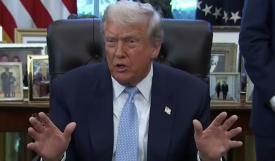Steve Jobs Movie 2015 - 'Man in the Machine' Reviews & Reactions: Film Tackles Question of Who Apple Inc. Founder Truly Was
The new "Steve Jobs: Man in the Machine" documentary released this weekend is raising as many questions as answers about the Apple Inc. founder.
Jobs died of pancreatic cancer in 2011, and Alex Gibney's searing portrait of him greatly raises the level of interest in the man who created the Macintosh and countless other era-shifting gadgets.
"One of the reasons we wept was that [Jobs] was our guide in this journey to become more intimate with our machines, particularly our computers," the L.A. Times reported Gibney recently told the "Marketplace" radio program.
By focusing on the totality of who Jobs was, even the unsavory parts of him, Gibney hinted he hoped to fill in many of the blanks surrounding the burning question of what made him tick.
The Times added, "Beyond Jobs' role as a tech evangelist, his ability to charm, disarm and cajole both rivals and acolytes created an almost Shakespearean aura around his death."
It all serves to raise one question about Jobs: Was he more "ruthless despot or a contemplative visionary?" And did his purported genius justify the level of arrogance he's remembered by many for sporting?
Gibney's project is hardly the first to delve into the world of Jobs and the way he operated. Walter Isaacson's "Steve Jobs" was published in 2011 and the movie "Jobs" starring Ashton Kutcher hit the big screen in 2013.
Still on tap is the flick "Steve Jobs," set to be released later this fall starring Michael Fassbender.
Engadet opined, acclaimed as he might be, the German-Irish-born star might find conquering the task of channeling Jobs' "Zen Buddhism beliefs with his massive ego and ruthless tactics," quite the challenge.
The website added, at various times throughout his life, Jobs desperately wanted to become a Buddhist monk, but was encouraged instead to "bring Zen ideas into his work."
To peruse a USA Today review of the film is to conclude that Jobs fell woefully short of fulfilling that mission. The newspaper concludes "when all is done, you walk away learning that the man was a revered monster, horrible to most everyone around him, someone who skirted the system, cheated credits and made his products as cheaply as possible, in inhumane conditions so horrible some responded with suicide."
Apple Vice President Eddy Cue previously blasted the film on Twitter as "inaccurate" and "mean spirited."
Subscribe to Latin Post!
Sign up for our free newsletter for the Latest coverage!
© 2025 Latin Post. All rights reserved. Do not reproduce without permission.















